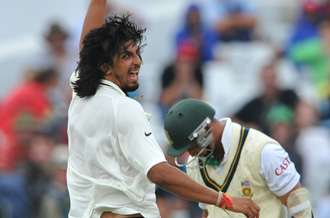How well-earned were the Ashes?
England deserved to crush a mediocre Australia side but ending the reign of India and South Africa could be beyond them.

 |
| Time will tell whether England’s thrashing of Australia means they can be a dominant Test force [GALLO/GETTY] |
I remember it to have been a warm summer’s day in the seaside city of Durban; day two of the Boxing Day Test between South Africa and India.
With India already two wickets down in the morning, chasing South Africa’s modest first innings total of 235, the much-vaunted duel between batsman Sachin Tendulkar and pace bowler Allan Donald had spectators glued to their seats, or staring intently at their television screens.
Keep reading
list of 4 itemsPakistan and New Zealand T20 abandoned due to rain after two balls
Australia’s Smith joins Washington Freedom before MLC cricket season
Jadeja reaches IPL cricket milestone in Chennai’s win over Kolkata
Tendulkar bides his time, then finally plants his front foot forward and sends Donald hurtling through extra-cover.
Then Tendulkar, with little foot movement this time, leans forward to the next one: a wide half volley, and carves Donald neatly into the advertising boards. The pundits begin whispering furtively. Was this the Tendulkar innings they had been waiting for?
The whispers were soon silenced.
Donald returned with a devilish off-cutter that sent the Little Master’s off-stump cartwheeling through the Kingsmead grass.
Tendulkar walked back to the change room leaving the visitors at 52/4, which soon turned into 100 all out.
South Africa scored a further 259 in their second innings and bowled India out for a pithy 66 to win the Test by a crushing 328 runs, within three days.
This was 1996. How things have changed.
Indomitable
Back then, the Australians were just beginning to look indomitable. South Africa were rapidly gathering respect and India, despite their nifty wrists and adoring fans, were still the home series specialists (thanks to carefully prepared “snake pit” pitches).
The West Indies had Brian Lara and a few glorious beaches; Pakistan had Waqar and Wasim and too many inconsistencies, Sri Lanka had just become the loveable dark-horse one day international outfit and England, well – that Lord’s was the home of cricket was seemingly up for debate.
|
“Other countries may be pondering what winning the famous old Ashes urn in Australia really means…what is the Ashes worth without a formidable Australian outfit, or without a close fight?” Azad Essa |
Fast forward 14 years and the fortunes of the cricketing world have been emphatically turned on their head.
While India had previously come to South Africa with little more than a coach, spare shoes and snorkelling gear for a fabulous summer holiday, ‘Team India’ arrived in December 2010 with strong ambitions to defend their number one Test rating against a mighty South African line-up, themselves just a series victory (they needed to win 3-0) away from claiming the number one spot for themselves.
In the event, a 1-1 series draw leaves little to choose between the top two Test sides.
On the other side of the Indian Ocean, having dominated cricket for more than a decade by bullying grown men into submissive school boys, Australia welcomed an England team fancying their chances in the most prestigious and celebrated rivalry in world cricket.
Four years ago, having retrieved the Ashes at home in 2005, England were nailed 5-0 by a vengeful Australian team before winning again in England in 2009.
Australian dominance was on its way out, but defeating them Down Under would still require overcoming the immense pride, hunger and venom of a well-oiled Aussie machine that had gathered enough momentum to roll over teams through mere reputation alone.
The stern resolve of strict discipline built by Allan Border, subtly refined by Mark Taylor and then brutally institutionalised by Steve Waugh’s instruction of “mental disintegration” were only made possible through the exploits of Glenn McGrath, Shane Warne and Matthew Hayden.
Only menace
Today, Australia have Shane Watson opening the batting and Mitchell Johnson as their much-overworked strike bowler, the only real menace in an otherwise tame lineup.
And England marched on, swung the Aussies around through emphatic seam bowling and fearless batting and beat them, resoundingly, in their own backyard for the first time in 24 years.
 |
| India and South Africa ended their most recent Test series with honours even [GALLO/GETTY] |
This is no trivial achievement.
But while English cricket fans are basking in the glory that has eluded them for an entire generation, other countries may be pondering what winning the famous old Ashes urn in Australia really means.
And the question must be asked, what is the Ashes worth without a formidable Australian outfit, or without a close fight?
England’s 3-1 series win came with three innings-defeats of the hosts. Brilliant England or terrible Aussies? For 24 years prior, it was the precisely the other way round. England rarely left for home with any dignity.
Furthermore, with India winning against Australia at home in 2008, South Africa winning in Australia in 2009 and now with England retrieving the Ashes, it tells us volumes about Australian cricket but reveals very little about how this England team would fare against India or South Africa.
In comparison, both India and South Africa are at the crest of their fortunes.
An India-South Africa contest continues to intensify without the hype of the Ashes, and one gets the feeling that a hotter rivalry is simmering.
Already, there is talk about converting the South Africa-India into an elite fixture, which would mean a minimum of four Test matches.
Meanwhile, England’s reputation grows as draws against South Africa at the beginning of 2010 and series victories against Bangladesh and Pakistan later in the year attest.
But the tours by India and Sri Lanka of England in later 2011 will further indicate if the English are serious contenders, or bystanders cashing in on the demise of Australian cricketing fortunes.